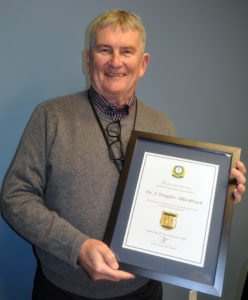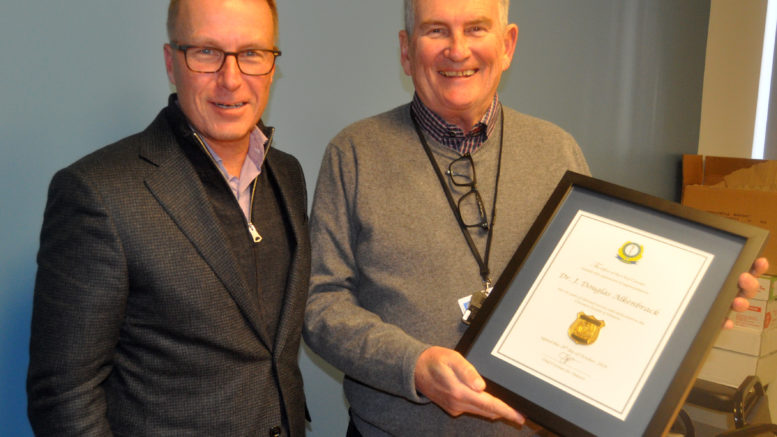Physician said investigation of deaths helped inform his medical practice
Adam Bramburger
Beaver Staff
The next time an unexpected death occurs in the Napanee area, Dr. Doug Alkenbrack won’t get the call.
After 44 years of service as an investigating coroner, Alkenbrack handed in his badge and vest to East Region supervising coroner Dr. Paul Dungey last Thursday, signifying his retirement from the role.

Dr. Doug Alkenbrack shows off a plaque commemorating his 44 years of service as an investigating coroner. (Adam Bramburger/Staff)
Alkenbrack started his medical practice in Napanee in 1972. Within four years, the area’s only coroner, Dr. Robert McLellan, recruited him to take on some of his caseload. Someone from the province visited his house for an interview and a one-day lecture and it wasn’t long until cabinet at Queen’s Park appointed him.
“I guess one of my colleagues who was a coroner couldn’t handle all the work, so he convinced me it was an interesting vocation. It certainly wasn’t for the money, our initial investigations were like $15-20,” he recalled. “I realized I really do like this work and I learned about what happens and how people can die. As a physician, it helped me learn about mistakes that we all make and sometimes the results can be tragic. You learn a lot about medicine and about treating mistakes.”
Alkenbrack said some of the deaths he was called to investigate were difficult to come to grips with — particularly suicides and those involving young children. He did relish the fulfillment of helping people through distress.
“The original coroner’s creed was that we work through the dead to protect the living. There was that preventative aspect of the coroner’s system. You investigate a death in hopes you could prevent a similar death from occurring in the future.”
Dungey added that coroners do that by investigating facts like the “who, who, when, where and by what means” to satisfy the needs of families and the public for answers. Then, they turn to prevention.
Alkenbrack acknowledged it isn’t a job for everyone.
“It’s always difficult. Because of my role as a physician, I have some skill in talking about bad news and bringing bad news to people. You feel like you can do it in a meaningful and emphatic way. If something is very difficult, someone has to do that and sometimes coroners are the best people to do that.”
Early on in his career, Alkenbrack worked largely independently. He’d call and conduct his own inquiries for cases that were in the public interest and he’d take annual courses in Toronto. As time went by, he says methodology has changed.
“The system has totally changed. It’s much better with a more state-of-the-art evidence-based system than it used to be. When I was appointed coroner, I could call an inquest and I had several inquests on my own — a lot of mandatory ones, we had to do them for prison deaths,” he said, estimating he presided over about 20 inquests.
Now, coroners work in a regional system, integrated with regional coroners and pathologists. There is a greater focus on forensic science. Police identification teams are more involved in the practice. Across Ontario, there are were than 100 inquests each year. There are also more resources for bereaved families outside the system.
Before, and even now, a number of deaths were classified as undetermined. Alkenbrack likened the job to putting together a puzzle and, in some cases, coroners can pinpoint the most likely cause of death, but not a certain one. Some causes, he said, can’t be found by doing a post-mortem exam or even toxicology. In more recent years, genetics and molecular autopsies have been sued with more frequency, but there are still some unknowns.
Dungey notes that coroners sometimes see the results of medical conditions doctors wouldn’t see at hospital because people have died before they were able to get medical attention.
Alkenbrack said he’ll miss getting those calls day and night to all corners of the county, including remote lakes north of Hwy 7 — he actually preferred the nighttime calls that didn’t play havoc with his medical practice — because he enjoyed the learning those calls provided. That said, he likes the idea of keeping set hours now, confining his medical work to two days a week at the Napanee Area Community Heath Centre.
“I enjoyed medicine enough that I have had a hard time getting away from it, I’ve retired a couple of times now, but it’s really great to have distinct hours, to do what you like doing and serve a population who needs medical care.”
While Dungey says the coroner system will miss the experience Alkenbrack provides, he noted the longtime Napanee investigator has helped leave North America’s largest death investigation system in good hands.
“It’s the good example of people like Dr. Alkenbrack that help me recruit future physicians,” he said.
Dr. Mamdouh Andrews has been a coroner for several years, while Dr. Craig Mitchell was recruited to the service two years ago. Dungey said Mitchell has offered similar feedback to Alkenbrack about how it informs and serves his medical practice.

